Events
EU Migration Policy
A LECTURE WAS HELD ON "UKRAINE'S ROAD TO THE EU: WHAT HAS BEEN DONE AND WHAT IS STILL AHEAD?"
As part of the implementation of Jean Monnet's project "EU Migration Policy within the Hybrid Threats" (101081717-EUMPHT-ERASMUS-JMO-2022-HEI-TCH-RSCH), on April 17, 2024, Tamara Kortukova presented a lecture for students of "Law" speciality at the College " Universum" of the Borys Grinchenko Kyiv University on the topic "Ukraine's path to the EU: what has been done and what is still to come?".
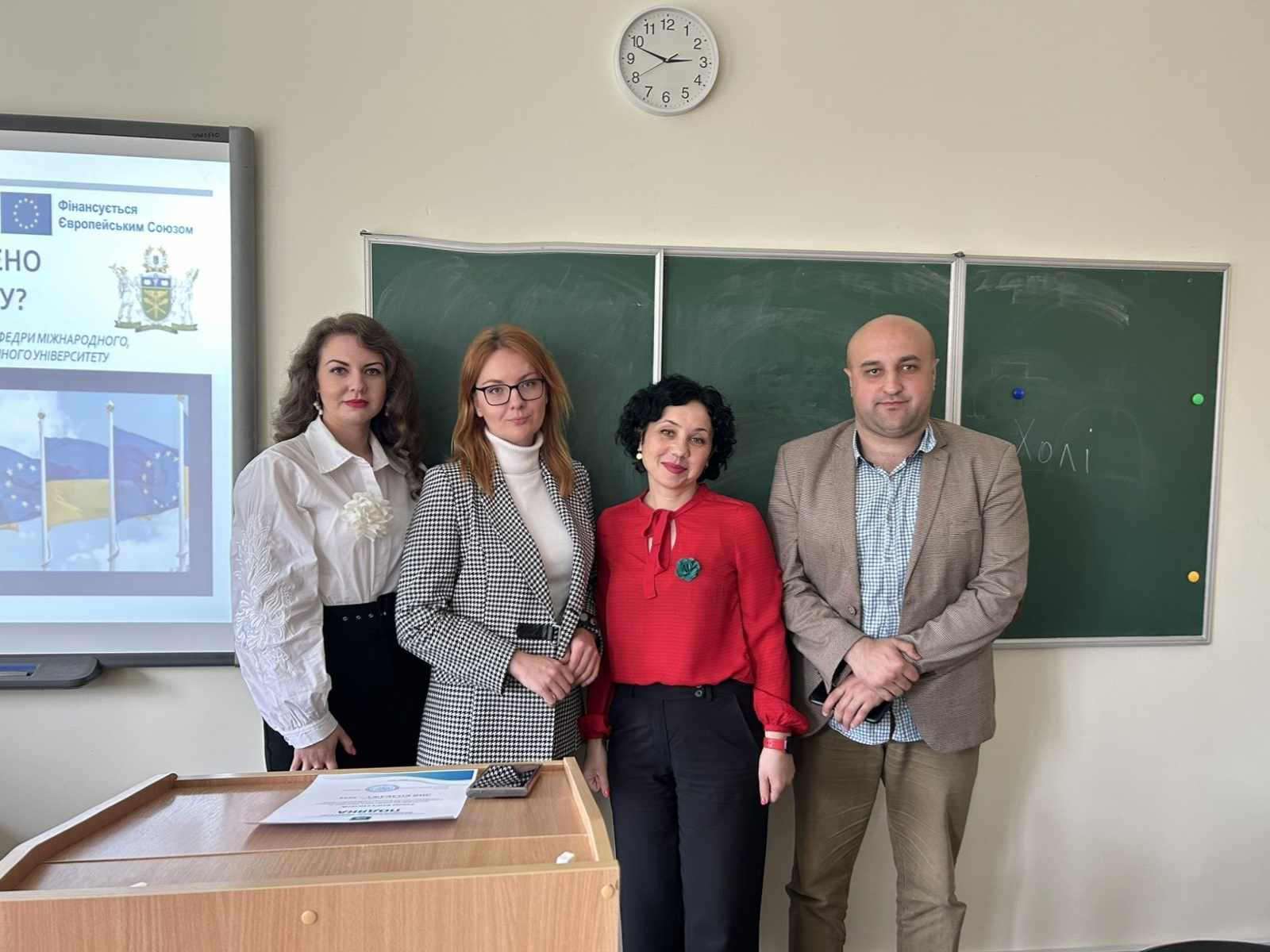
In particular, Tamara Kortukova talked about the criteria for the country's accession to the European Union; stages of the EU membership process; self-screening procedure; harmonization of Ukrainian legislation with EU law; and also focused attention on the stage of negotiations on Ukraine's accession to the EU in the context of each negotiating cluster.
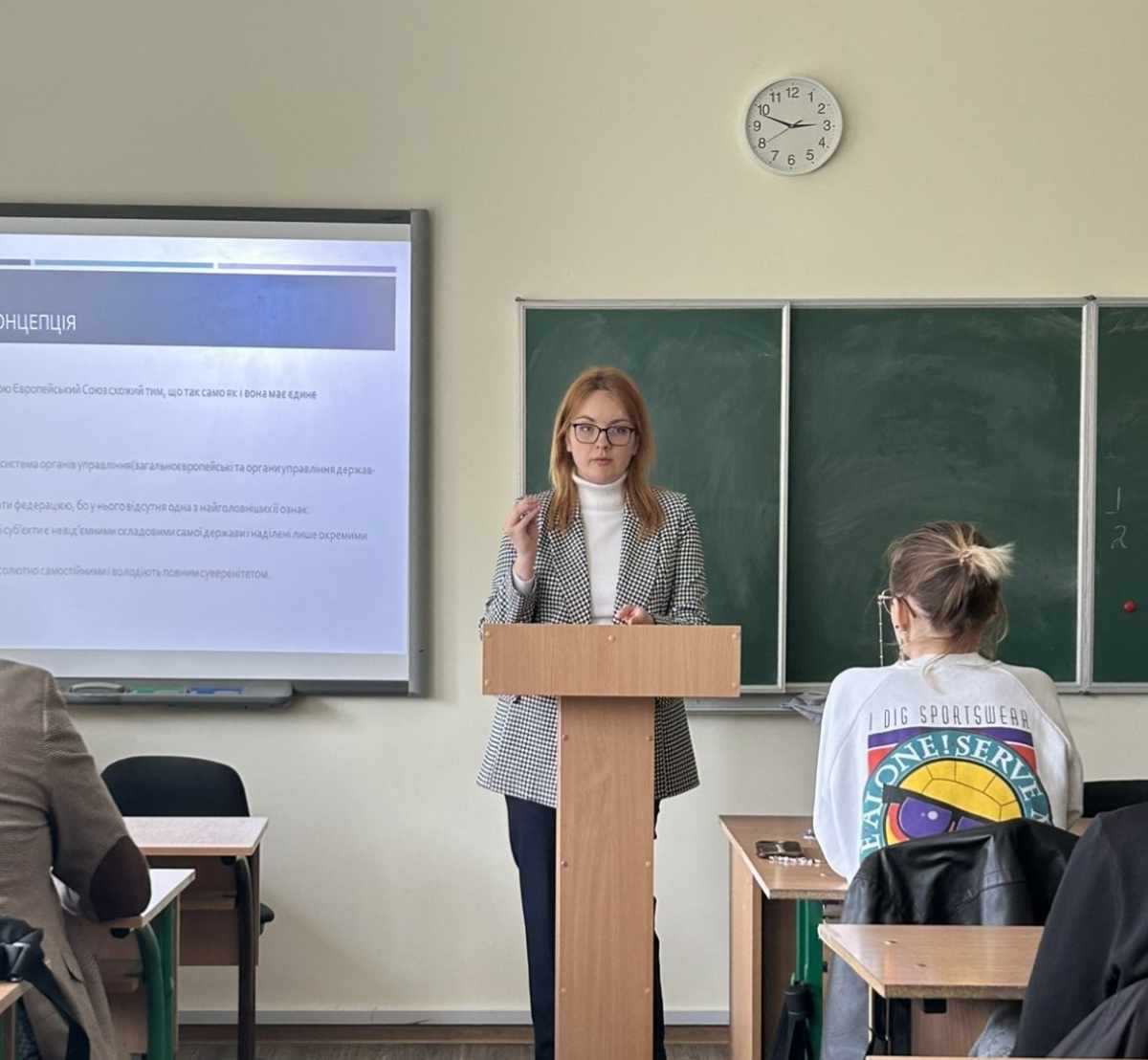
During the lecture, Tamara Kortukova presented Jean Monnet's project "EU migration policy within the hybrid threats" and invited students to participate in the project's activities.
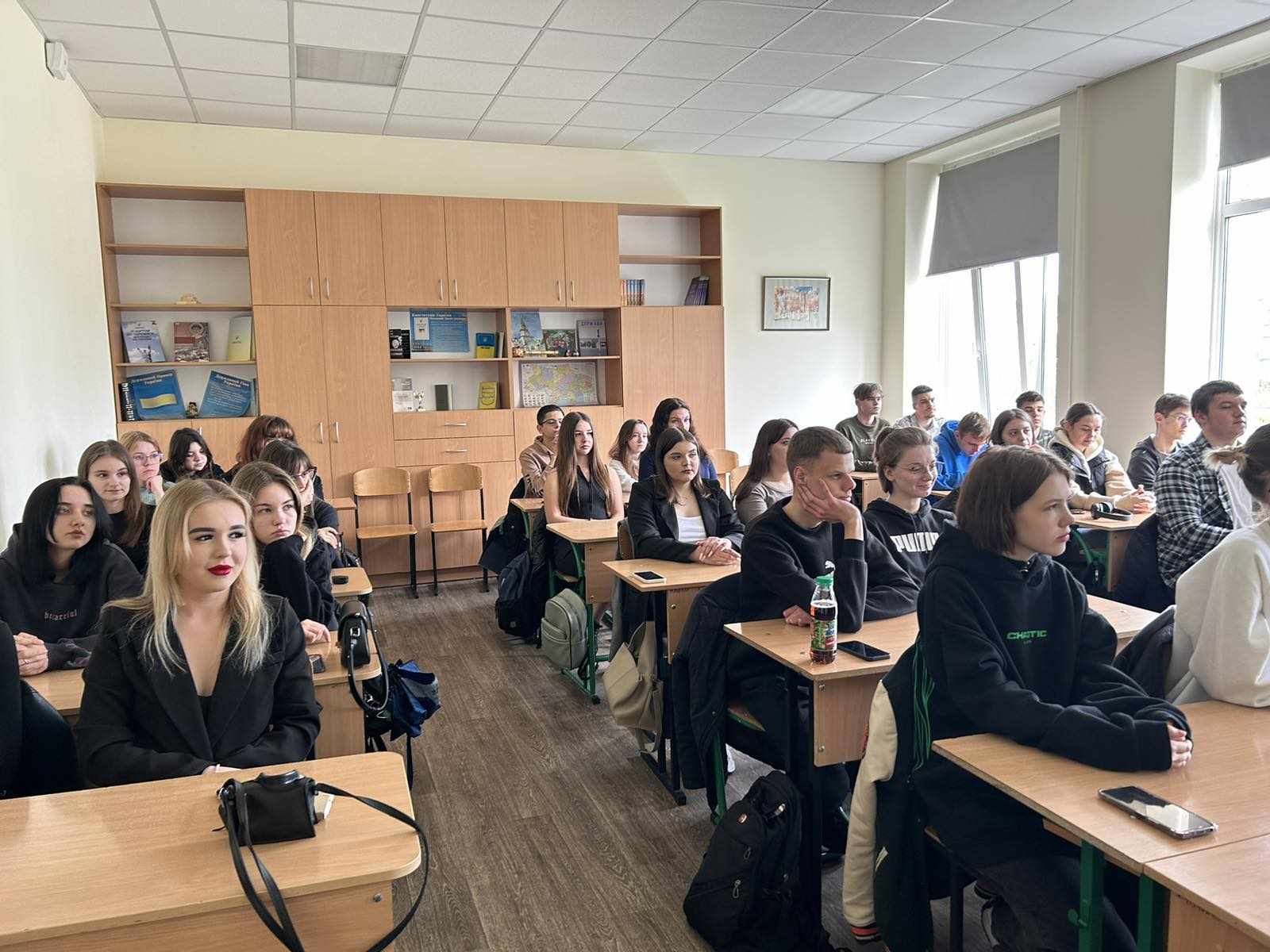
THE ONLINE TEXTBOOK “THE EU MIGRAION POLICY WITHIN HYBRID THREATS”
/file/MzA3NjU=/eb9aec54257989dc1a397f17d1c8590f.pdf
THE SEMINAR-CONFERENCE "EU MIGRATION POLICY: CHALLENGES AND PROSPECTS" WAS HELD
As part of the implementation of Jean Monnet's Module "EU Migration Policy within the Hybrid Threats" (101081717-EUMPHT-ERASMUS-JMO-2022-HEI-TCH-RSCH), which is implemented at the State University of Trade and Economics, on November 22, 2023, a seminar-conference "EU Migration Policy: Challenges and Prospects" was held.
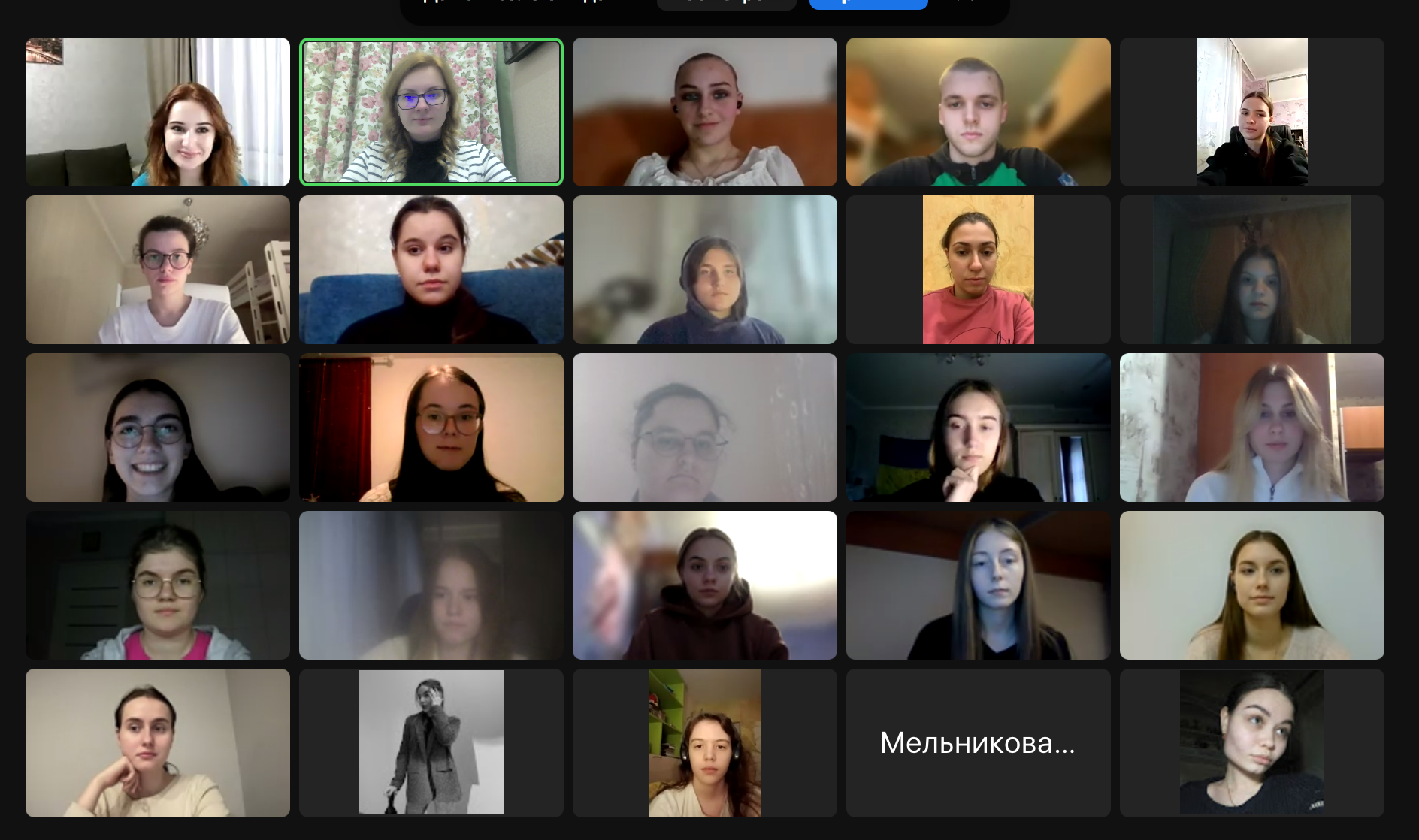
The work of the conference took place within the following thematic panels: Thematic panel 1. Legal regulation of migration processes in the EU; Thematic panel 2. Economic dimension of migration processes in the EU; Thematic panel 3. Migration through the prism of philology and intercultural communication; Thematic panel 4. Combating irregular migration within the EU.
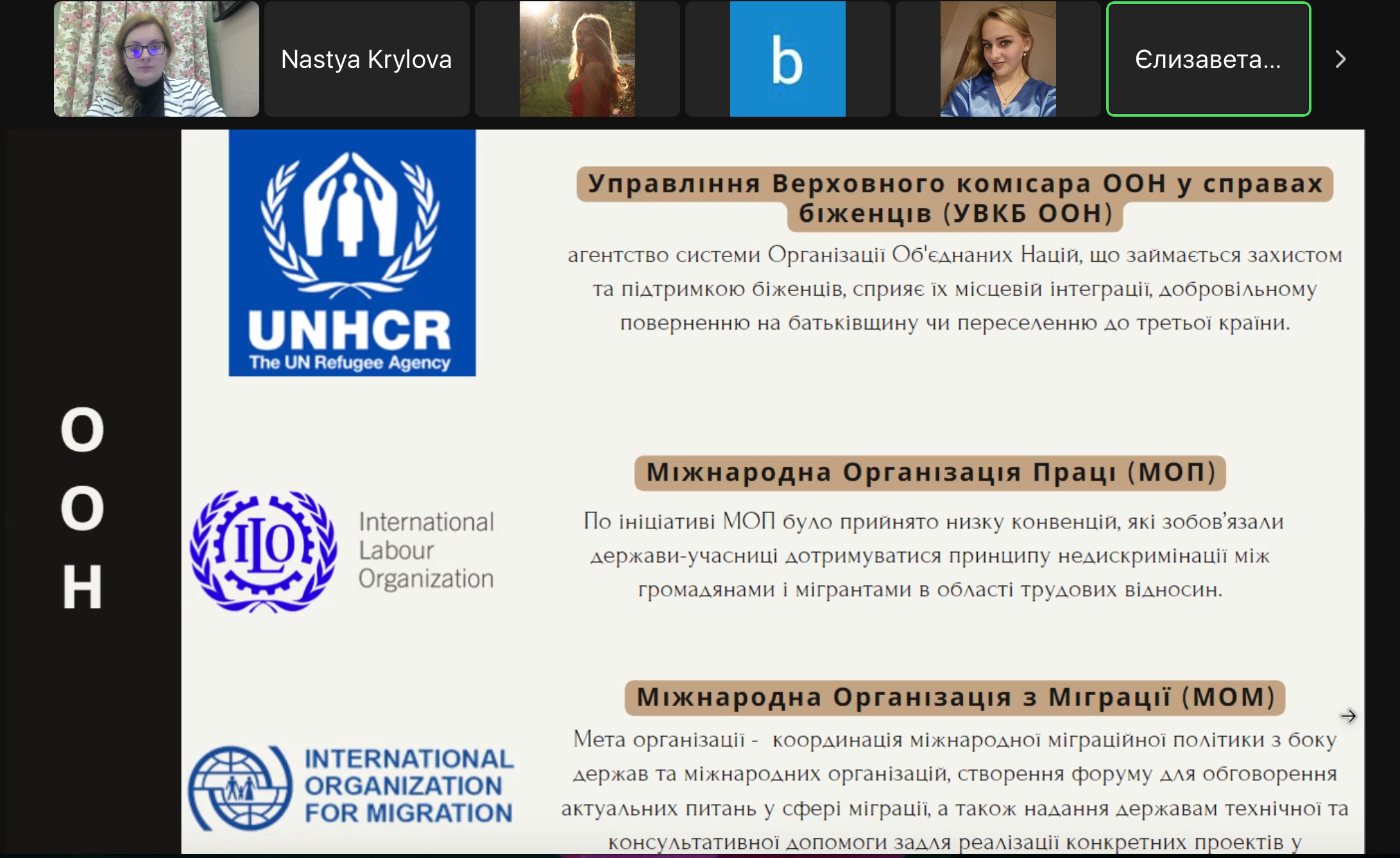
The following reports were presented within Thematic Panel 1: International legal regulation of migration processes (Karyna Kotvytska, Elizaveta Yemets); Development of common EU migration policy (Daria Shevchenko, Dmytro Kobernyk); Relevant practices of migrant integration (Anastasia Kutsenko, Yulia Voitsykh); EU migration policy within the hybrid threats: challenges and opportunities for immigrant women (Anna Shikhnenko, David Shaginyan); Lithuania's migration policy (Krylova Anastasia, Ostapchuk Zakhar).
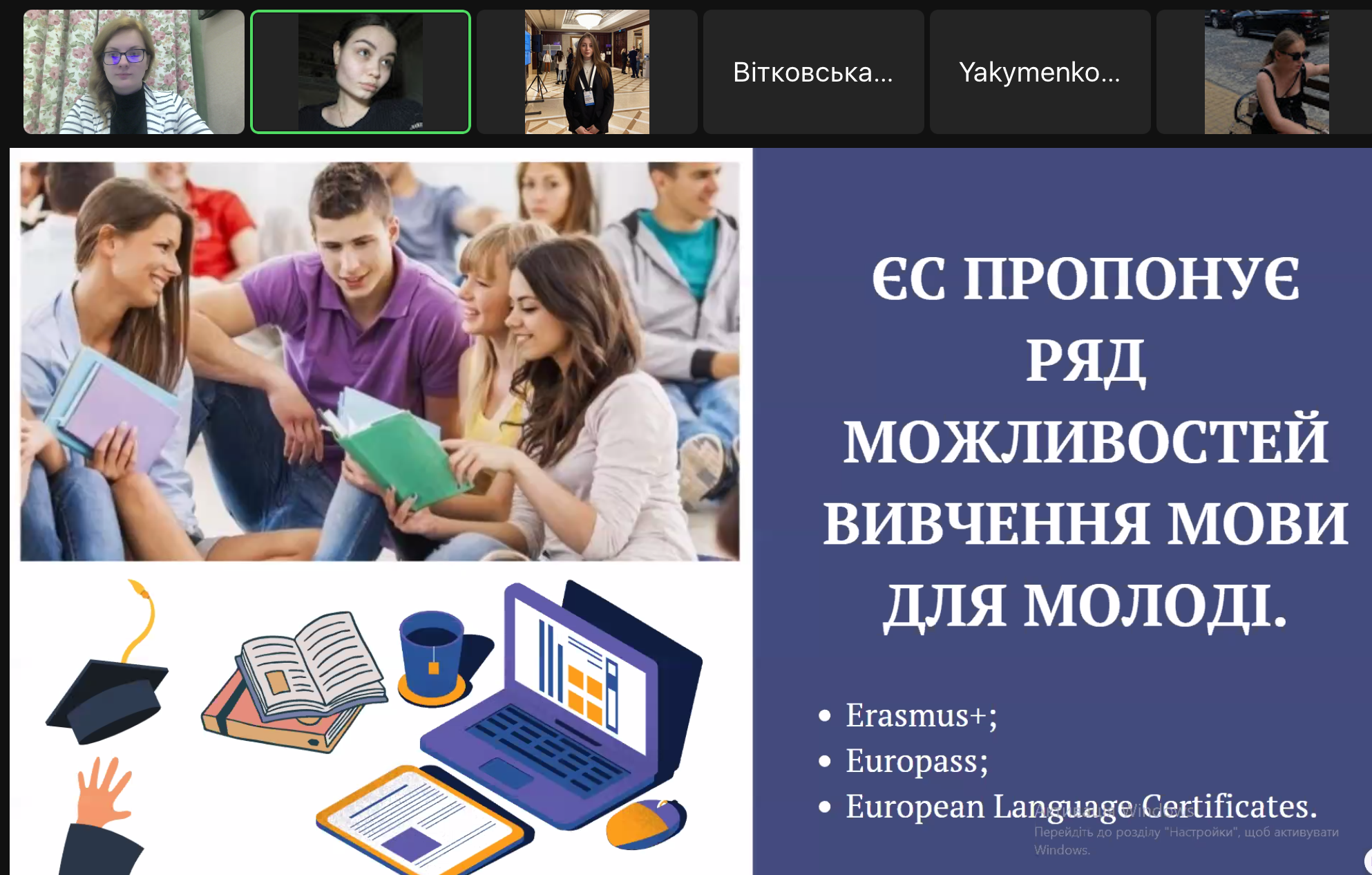
Thematic panel 2 of the Conference was devoted to the following issues: Migration challenges for the EU economy (Vasyl Antonov, Kateryna Vitkovska); Immigrants as a factor of economic development: why are migrants needed (Veronika Kravchynska, Victoria Yakymenko); Language learning and economic opportunities for young people in the EU (Bozhko Daria, Nechay Anna); Management of labor migration in EU countries (Malyutina Maya, Kozheurova Maria); Reforming gender policy in the conditions of European integration (Dushina Darya, Sydorenko Maria).
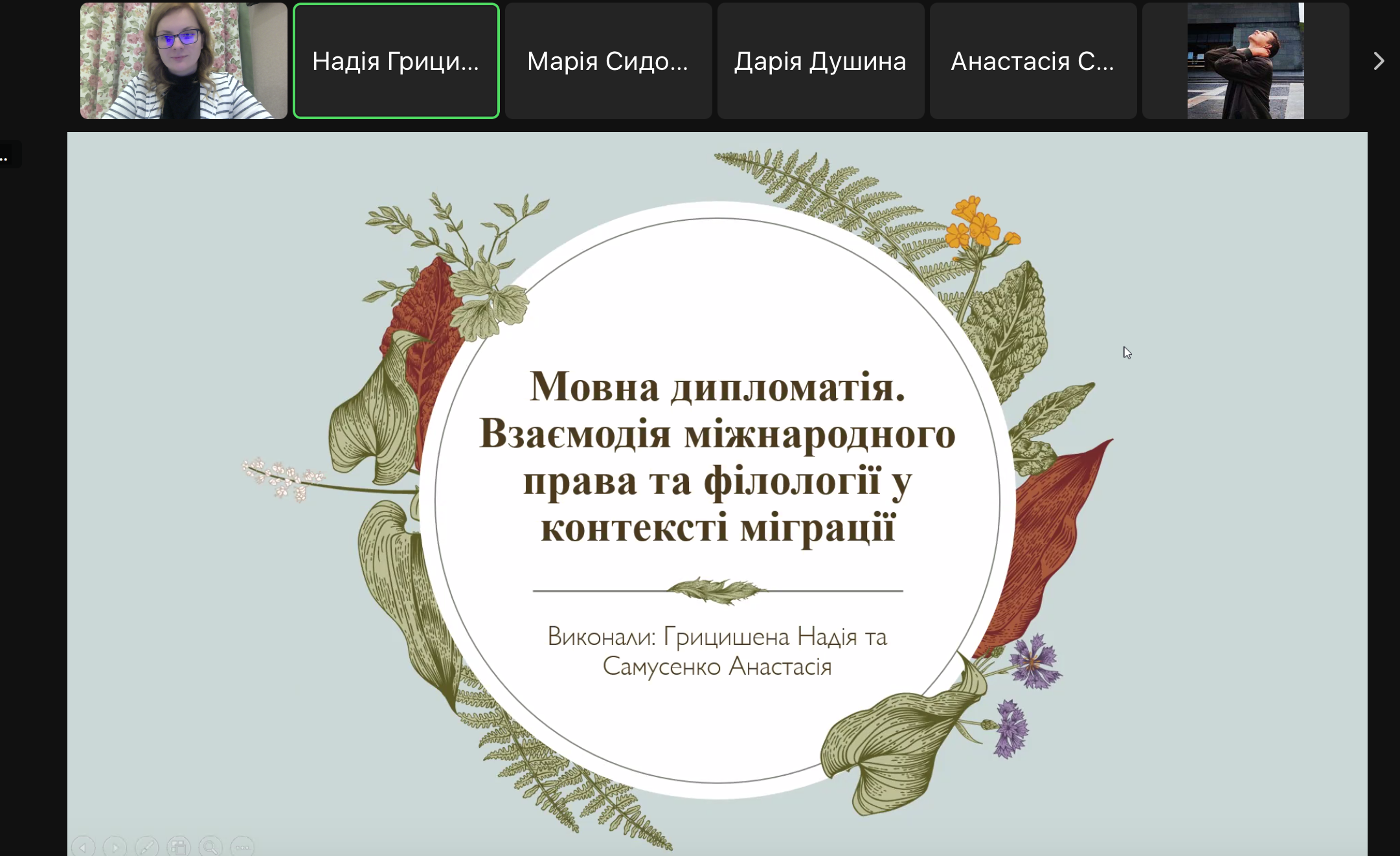
Within the framework of Thematic Panel 3, students paid attention to the research of the following topics: Language diplomacy: the interaction of international law and philology in the context of migration (Hrytsyshina Nadiya, Samusenko Anastasia); The role of the translator in the process of integration (Basista Yana, Viktoria Yaremenko); Language, culture and rights of migrants (Pochtar Anastasia, Burlachenko Anastasia).
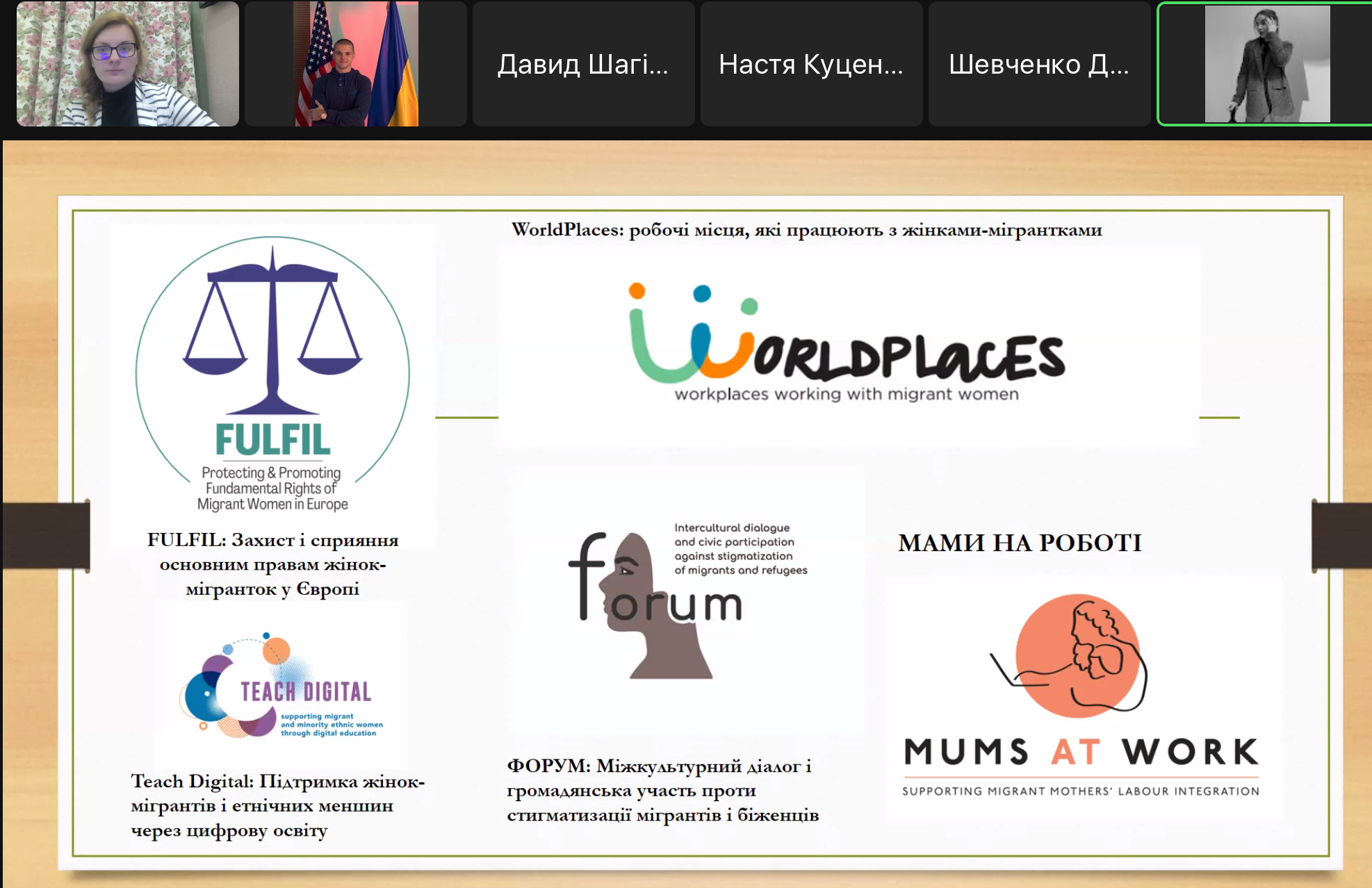
Thematic panel 4 of the Conference was devoted to the following issues: Current problems of illegal migration (Telendiy Anna, Kolesnyk Anastasia, Rovna Darya); EU policy on combating illegal migration (Adelina Tankovska, Elizaveta Melnikova); Peculiarities of combating illegal migration in the EU (Olexandra Popelyshko, Darya Shevchenko); European Commission Against Racism and Intolerance (Anastasia Kolesnyk, Anna Pokropivna).
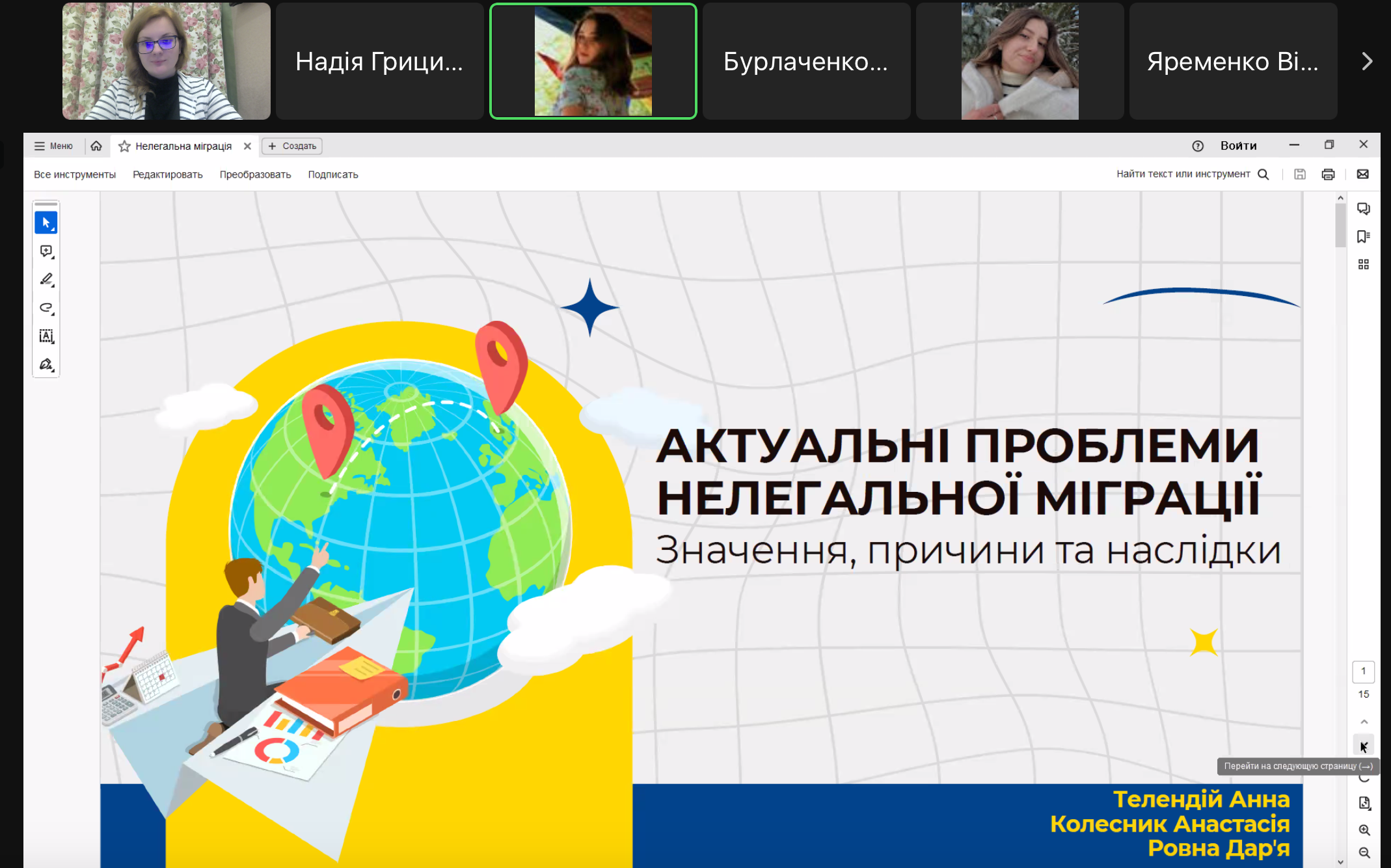
The moderator of the seminar-conference was PhD in international law, Associate Professor at the Department of International, Civil and Commercial Law, Head of the Jean Monnet Module "EU Migration Policy within the Hybrid Threats" Tamara Kortukova.
The 3rd and 4th Module of Jean Monet "EU Migration Policy within the Hybrid Threats" was conducted
From October 23 to November 22, 2023, a series of lectures on the migration policy of the European Union was held for students of the State University of Trade and Economics, as part of the Jean Monnet Module "EU Migration Policy within the Hybrid Threats" with the financial support of the EU.
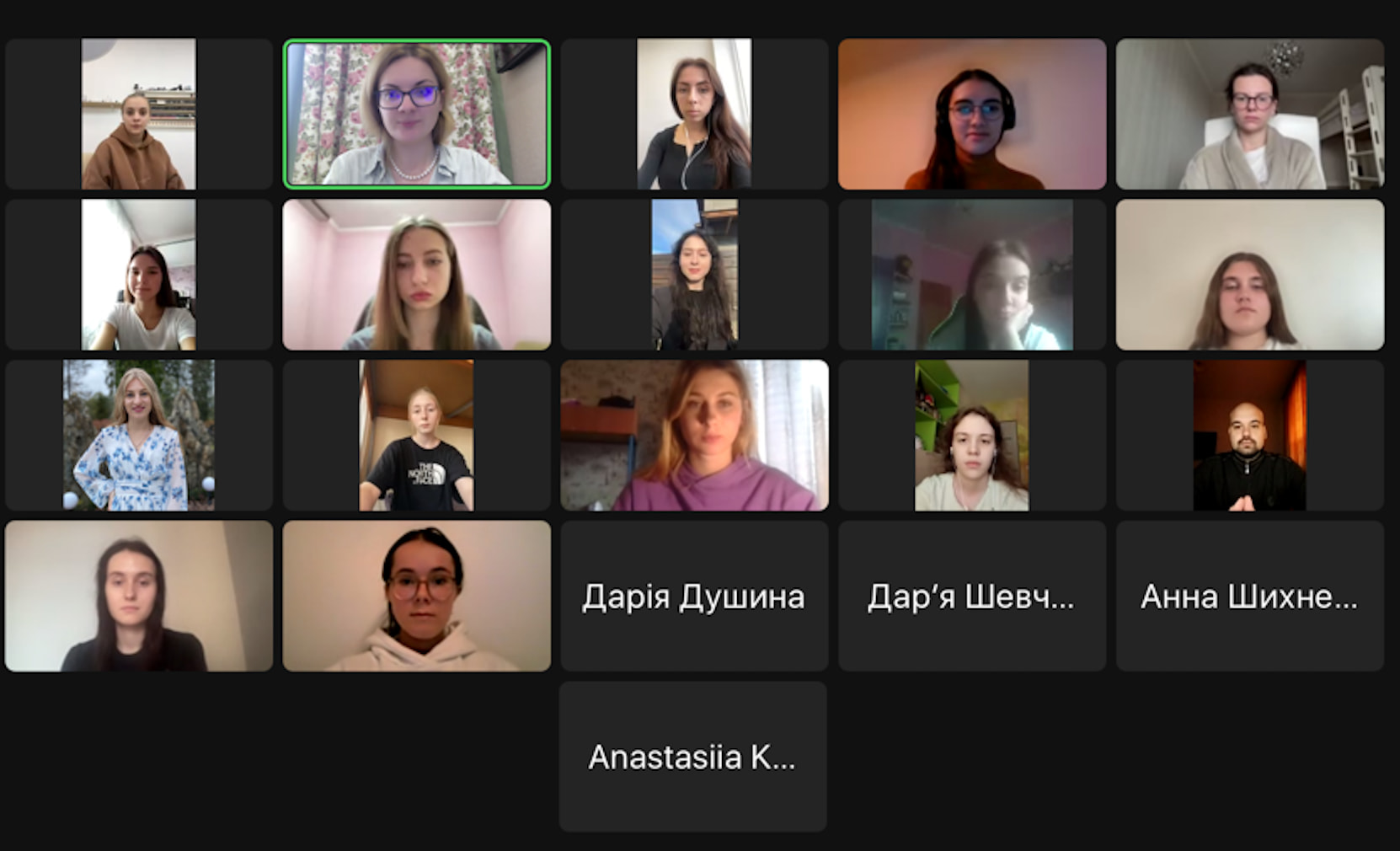
The Jean Monnet Program is one of the EU educational programs, the purpose of which is to increase the level of knowledge and awareness of society in the EU and beyond its borders on issues of European integration, by stimulating teaching and research activities on European integration.
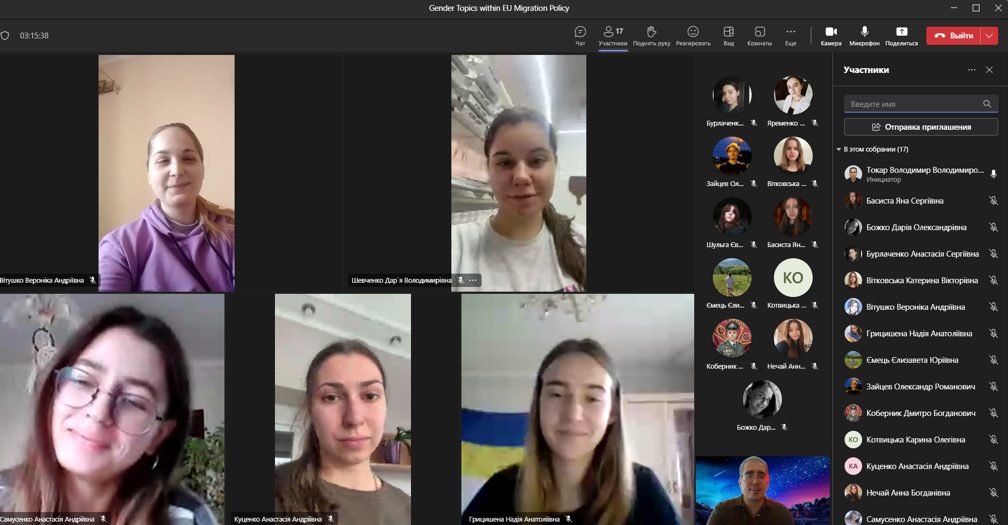
In particular, 97 students participated in the 3rd and 4th Module "Migration policy of the European Union within the Hybrid Threats".
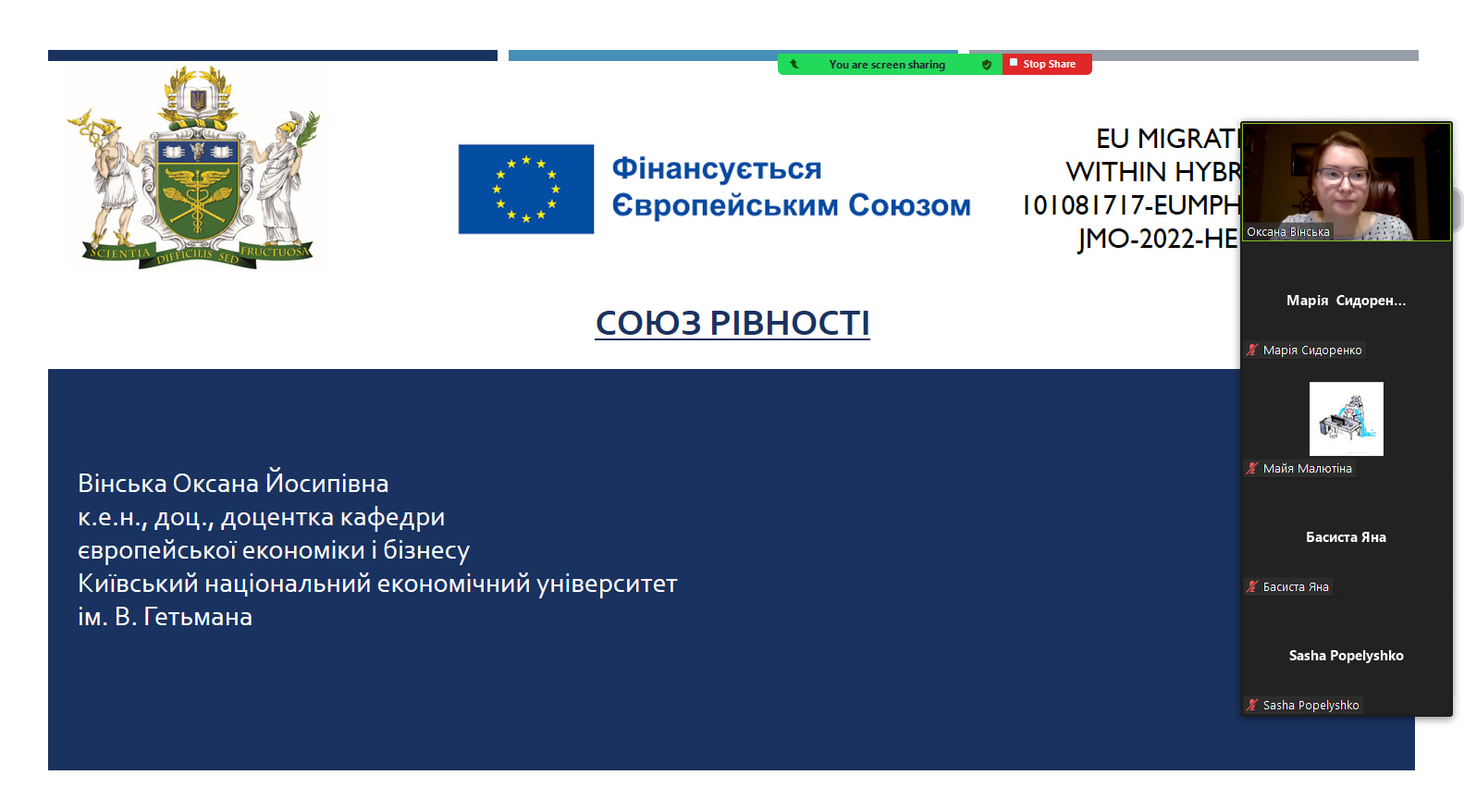
The third and fourth modules of Jean Monet "EU migration policy within the Hybrid Threats" brought together students from the following specialties: International Law; International Business; International Economics; Management of Foreign Economic Activity; Philology.
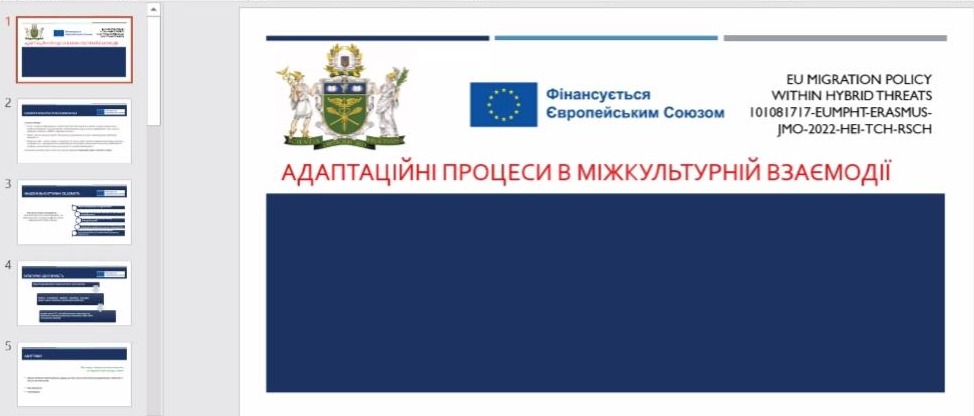
The participants discussed the practice of EU countries regarding the integration of migrants, current issues of citizenship in the EU, freedom of movement in the EU, gender equality in the EU, combating irregular migration and human trafficking in the EU, social protection of migrants, EU environmental strategies for communication interaction between migrants and the host society , the impact of robotics on EU migration policy, etc.
The lecturers of the modules were PhD in International Law, Associate Professor at the Department of International, Civil and Commercial Law of SUTE Tamara KORTUKOVA; Doctor of Economic Sciences, Professor at the Department of Software Engineering and Cyber Security of SUTE Volodymyr TOKAR; Candidate of Philological Sciences, Associate Professor at the Department of Modern European Languages of SUTE Nataliya TESLENKO; Candidate of Economic Sciences, Associate Professor at the Department of European Economy and Business, KNEU Oksana VINSKA.
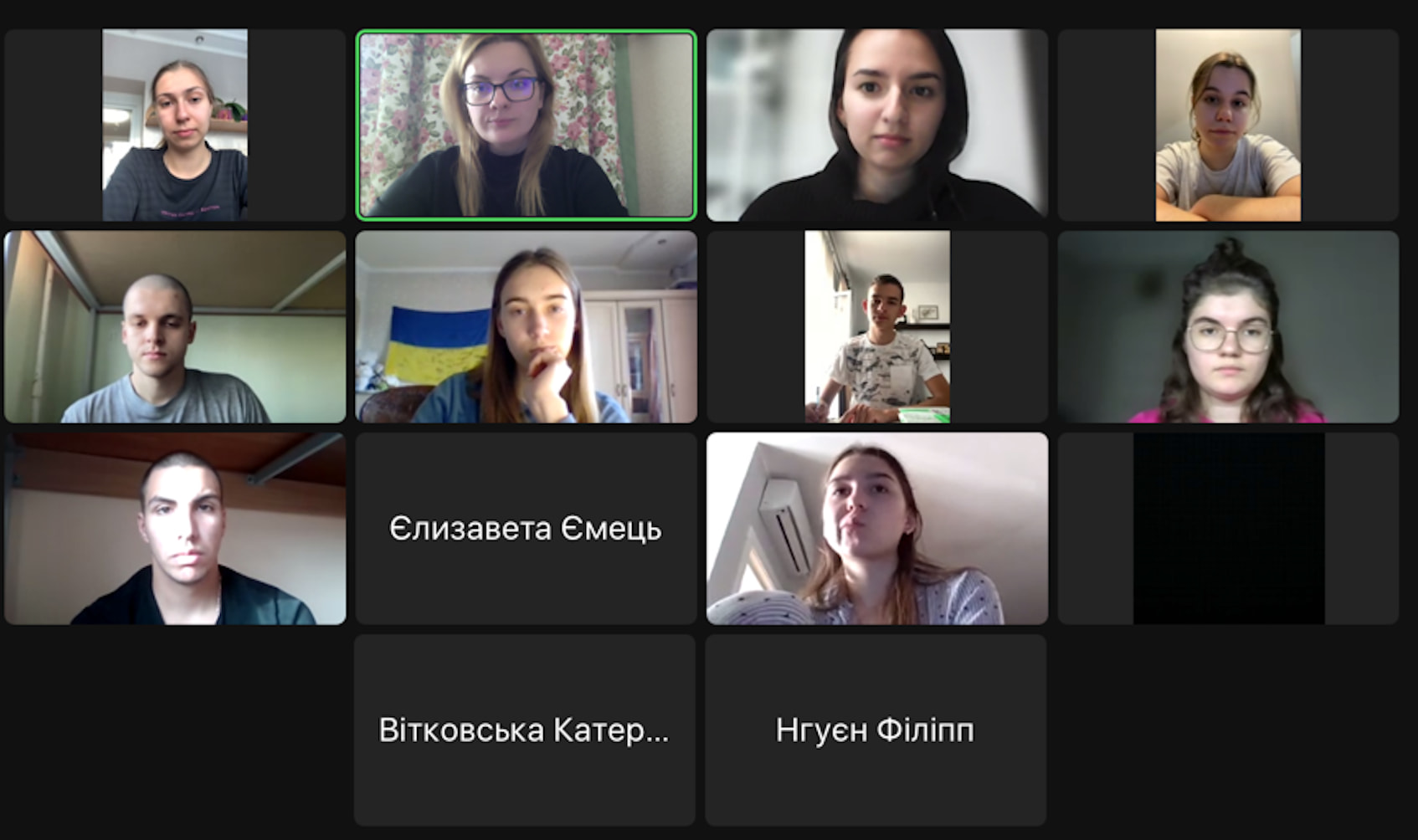
Upon completion of the Modules, participants were able to receive certificates.
PRESENTATION OF THE JEAN MONNET MODULE "EU MIGRATION POLICY WITHIN THE HYBRID THREATS"
On July 23, 2023, within the business trip to Krakow (Republic of Poland) under the Erasmus+ KA 107 program of academic mobility, the Erasmus Jean Monnet Module "EU Migration Policy within the Hybrid Threats" was presented to colleagues from Poland, the Dominican Republic and Hungary at the Krakow University of Economics. Inter alia, it was discussed the impact of migration processes in the modern world, as well as changes in society and their reflection in the educational process.
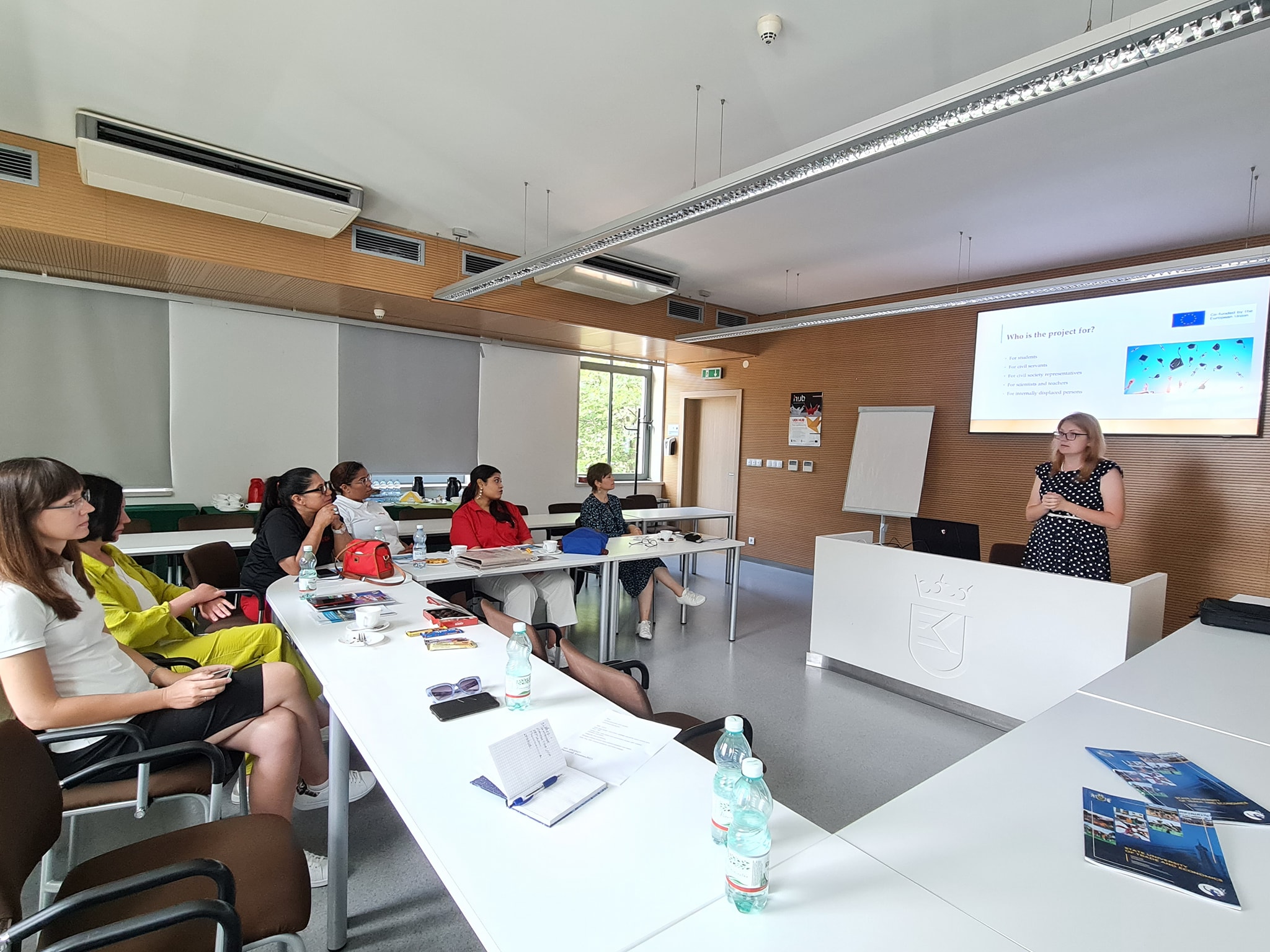
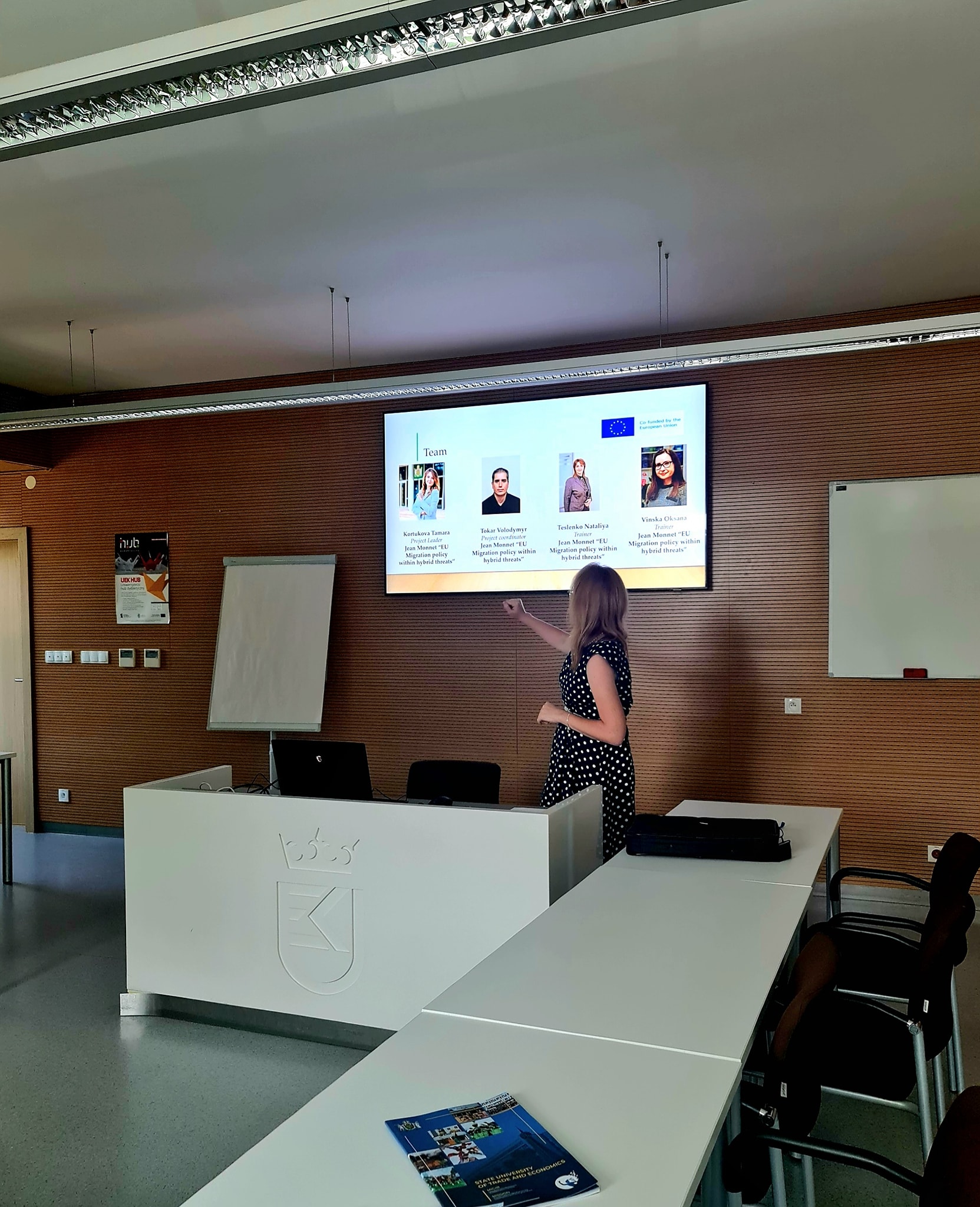
ONLINE CONFERENCE "MIGRATION POLICY OF THE EUROPEAN UNION: CHALLENGES, THREATS, PROSPECTS"
As part of the implementation of Jean Monnet's project "EU migration policy within the Hybrid Threats" (101081717-EUMPHT-ERASMUS-JMO-2022-HEI-TCH-RSCH - https://knute.edu.ua/blog/read/?pid=44528&uk ), which is implemented at the State University of Trade and Economics, on May 17, 2023, the online conference "Migration Policy of the European Union: Challenges, Threats, Prospects" was held.
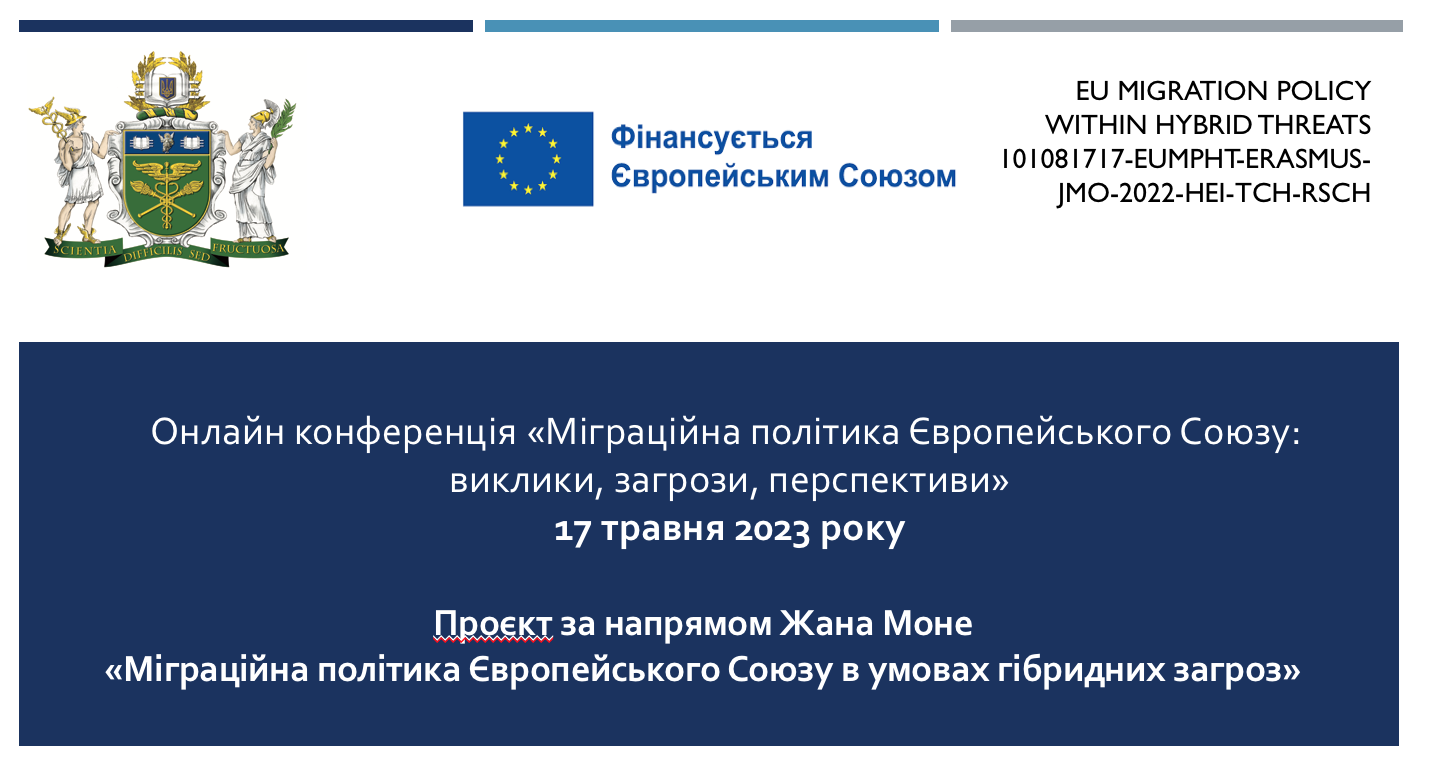
The conference was attended by representatives of the academic community, the public sector, civil society, as well as students.
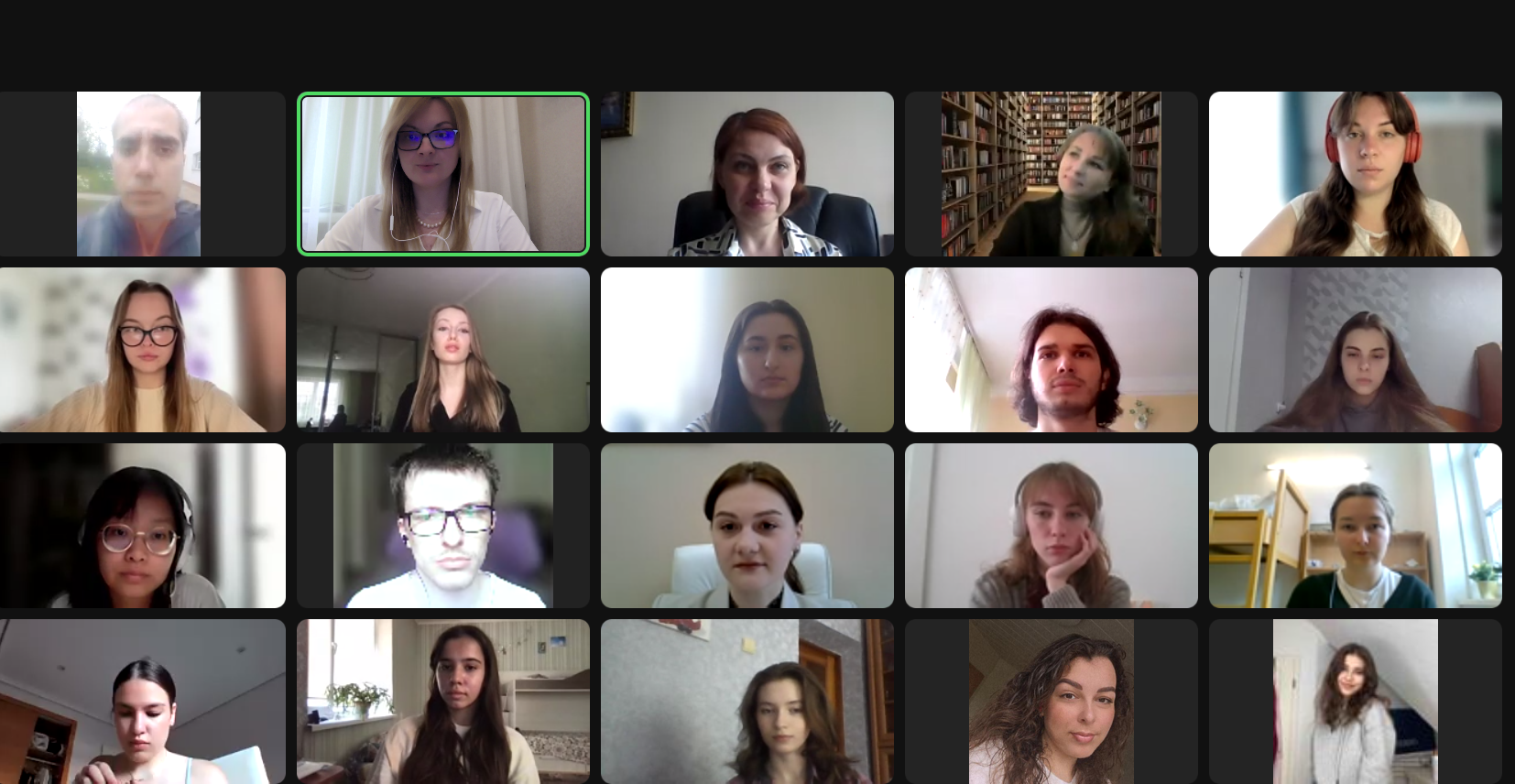
In particular, a welcome speech was pronounced by:
ALLA TARASYUK, Head of the Child and Family Rights, Youth and Sports Department of the Department for Monitoring Compliance with the Rights of the Child and Family, Youth and Sports of the Secretariat of the Human Rights Commissioner of the Verkhovna Rada of Ukraine;
ELVIRA TITKO, Doctor of Legal Sciences, Associate Professor, Professor of the Department of Information, Economic and Administrative Law of Kyiv Polytechnic Institute named after Ihor Sikorsky, head of the Board of the NGO "Ukrainian Center for Human Rights and Development of Educational Innovations";
NADIYA ZAGRISHEVA, Candidate of Legal Sciences, Head of the "Law" Department of the Kyiv University of Market Relations, Lawyer;
VOLODYMYR TOKAR, Doctor of Economics, Professor, Professor of the Department of Software Engineering and Cyber Security of the State University of Trade and Economics, Head of the Jean Monnet module "Economic security of the EU", Head of training of the Jean Monnet Department "The impact of European integration on the economic security of EU member states".
The work of the conference took place within the following thematic panels: Thematic panel 1. “Regulation of legal migration in the European Union”; Thematic panel 2. “Legal regulation of forced migration within the European Union”; Thematic panel 3. “Combating illegal immigration in the European Union”; Thematic panel 4. “The policy of integration of migrants in the member states of the European Union”; Thematic panel 5. “European integration processes of Ukraine in the field of migration policy”.
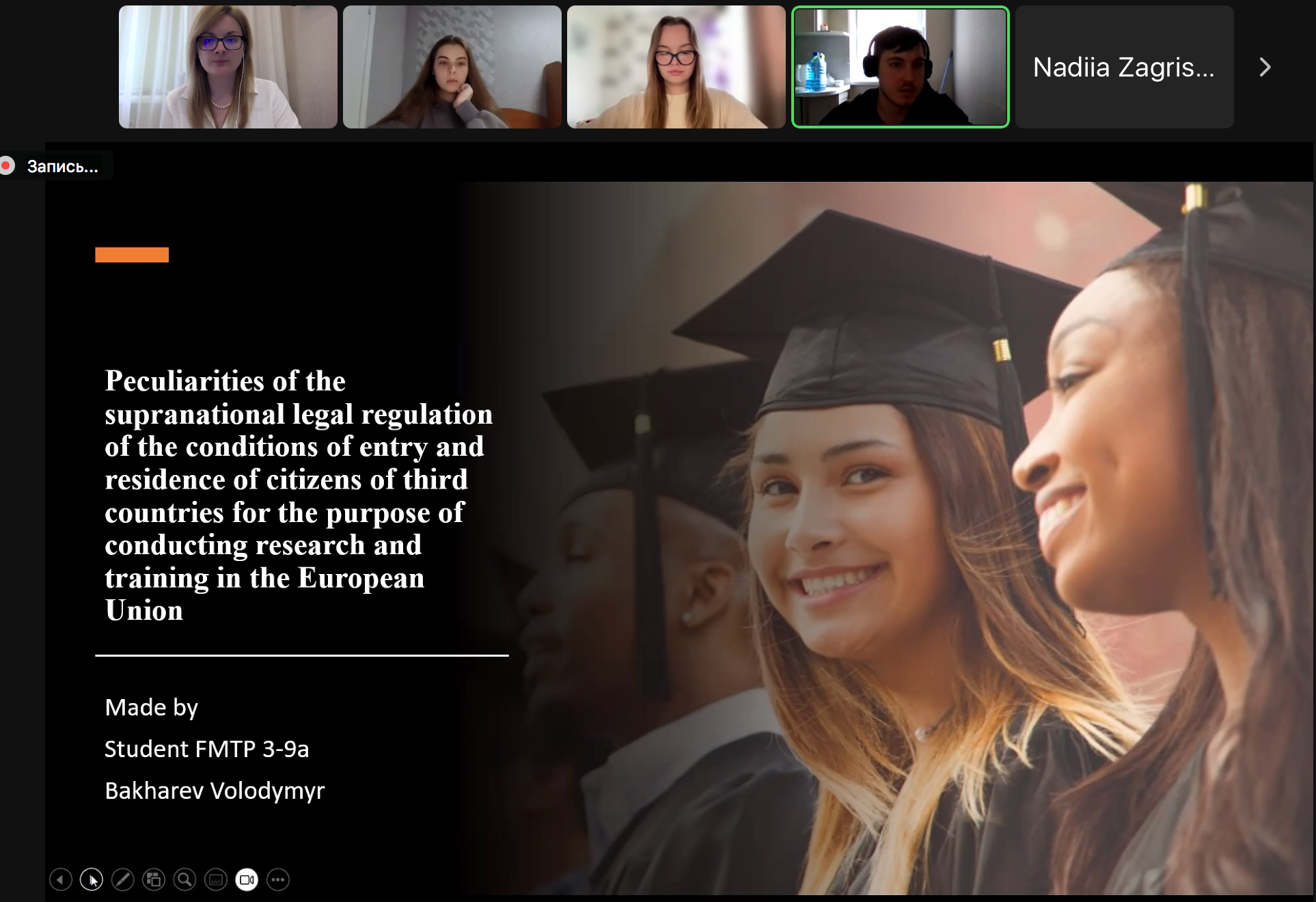
Within Thematic Panel 1, the following reports were presented: Impact of robotics on migration processes in the European Union (Anastasia Kovalenko); Peculiarities of supranational legal regulation of conditions of entry and residence of citizens of third countries for the purpose of conducting scientific research and training in the European Union (Volodymyr Bakharev); European Union standards in the field of protection of seasonal migrant workers (Alyona Razumets) European Union legislation on highly skilled migrants (Sofia Schmidt).
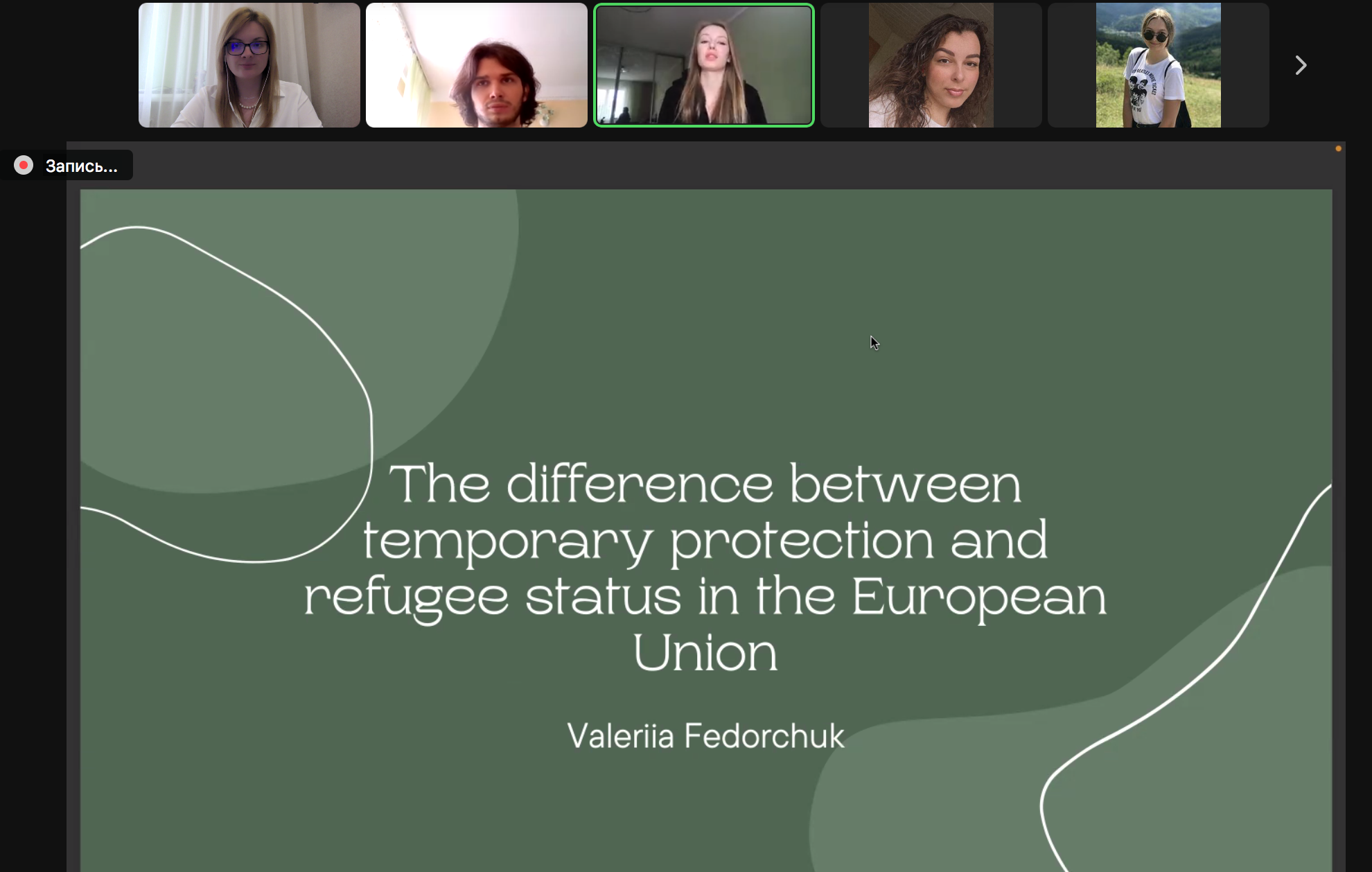
Thematic panel 2 of the Conference was devoted to the following issues: Peculiarities of the status of temporary protection in the European Union (Shaban Anna); The impact of Ukrainian forced migrants on the economy of host countries (Volodymyr Petrulevych); Legal status of refugees (Ilya Chaikin); Peculiarities of the process of obtaining asylum in Germany (Kush Olga); The difference between temporary protection and refugee status in the European Union (Fedorchuk Valeriya).
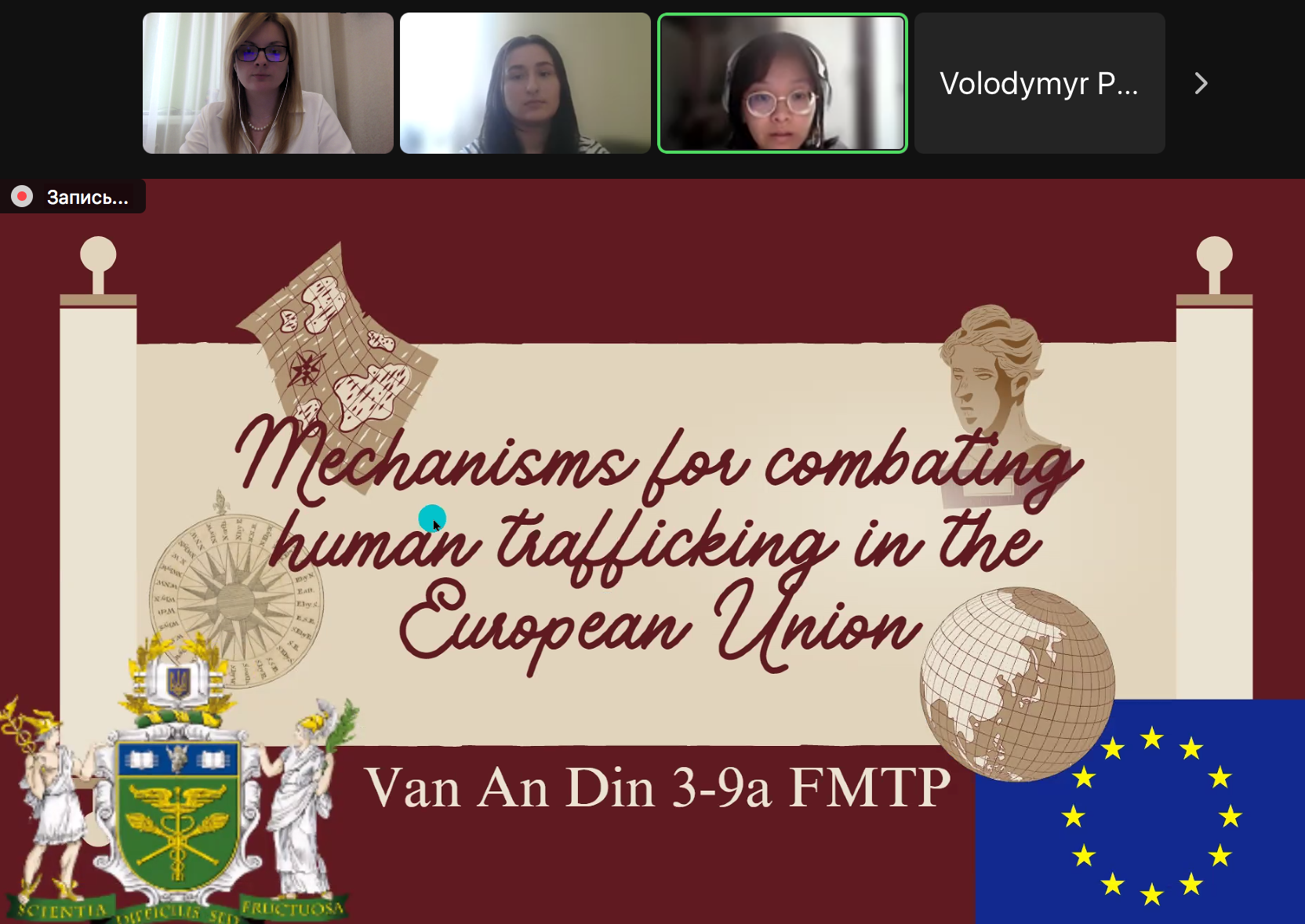
The following reports were presented within Thematic Panel 3:
Legal regulation of the fight against illegal immigration in the European Union (Shestopal Inna); Mechanisms to combat human trafficking in the European Union (Din Van An); Combating human trafficking in the European Union in the context of forced migration from Ukraine (Mazhynska Valeriya); Securitization of migration in the European Union (Koshman Margarita); Irregular migration and return policy in the European Union ( Gavrylko Daria); Combating illegal employment of migrants in the European Union (Olha Kulinska); Actions of the European Union regarding the Mediterranean refugee crisis (Bardega Oleksandr).
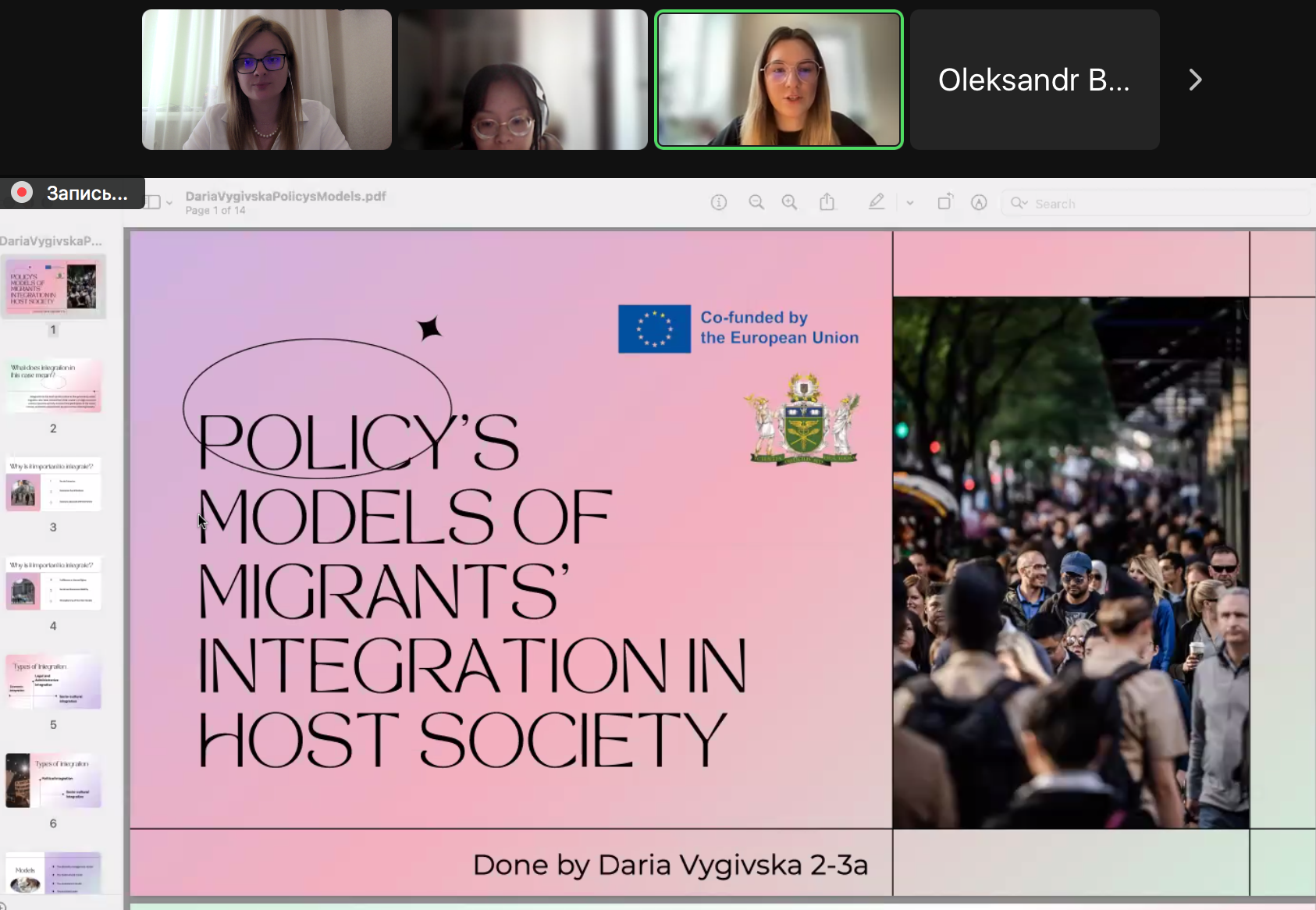
Thematic panel 4 of the Conference was devoted to the following issues: Models of the integration policy of migrants into the host society (Vyhivska Darya); Peculiarities of the integration policy of migrants in the member states of the European Union (Daria Yurchenko); Comparative analysis of the integration of migrants in the member states of the European Union (France, Germany, Sweden) (Luchko Yanina); Migrant integration policy in Sweden (Ivan Arkhipov).
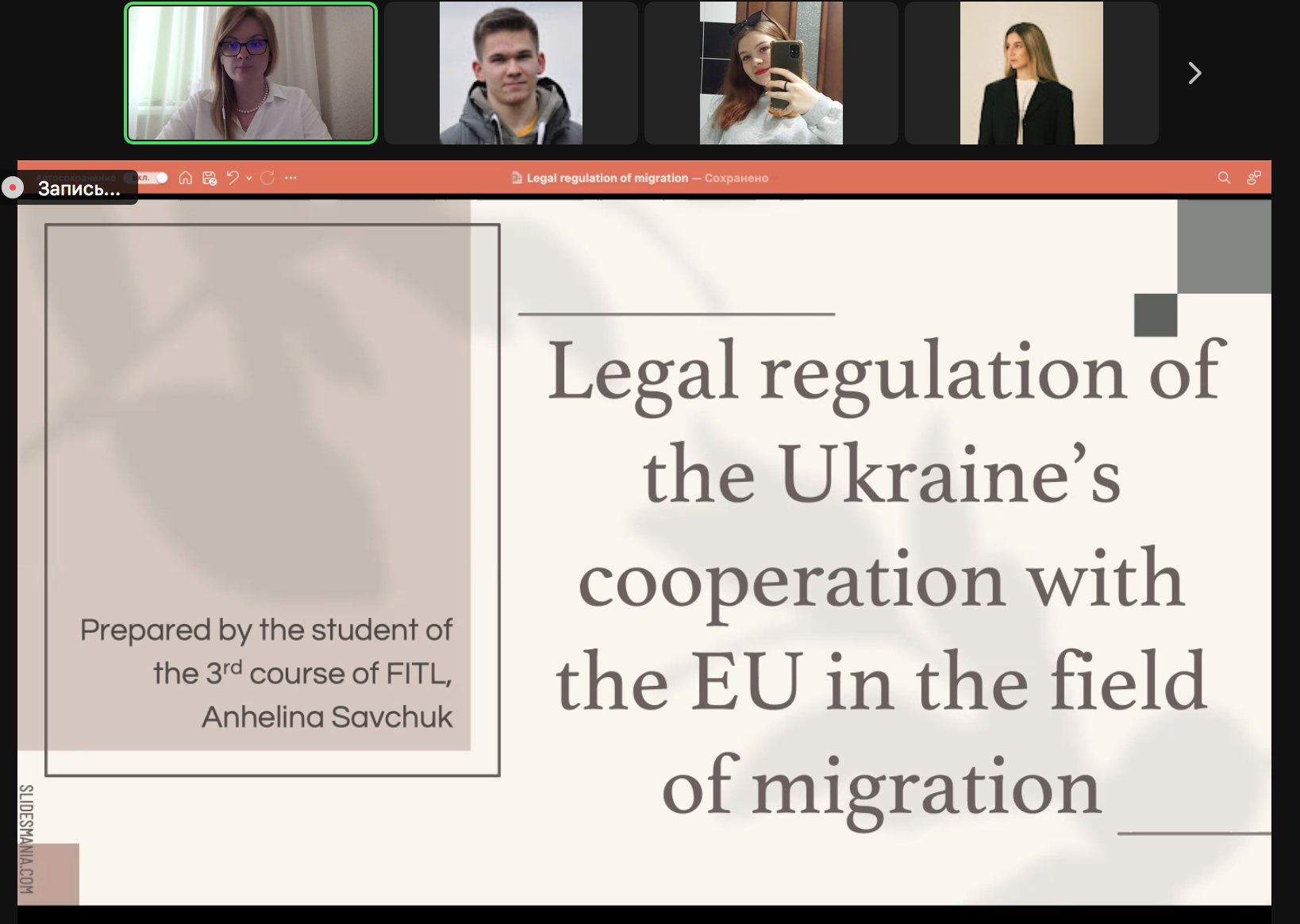
Within the framework of Thematic Panel 5, higher education students paid attention to the study of the following topics: Historical aspects of Ukraine's cooperation with the European Union in the field of migration (Ihor Chernyavskyi); Legal regulation of Ukraine's cooperation with the European Union in the field of migration (Angelina Savchuk); The policy of returning Ukrainian forced migrants from the European Union and their reintegration (Rodya Mykyta); The policy of returning Ukrainian forced migrants to the Motherland (Dmytro Kashuba).
The conference was moderated by PhD in the field of International Law, Associate Professor of the Department of International, Civil and Commercial Law of the State University of Trade and Economics, Head of the Jean Monnet module "EU Migration Policy within the Hybrid Threats" KORTUKOVA TAMARA
Training on the issues of EU Migration Policy within the Hybrid Threats
From November 12 to December 4, 2022, as part of the European Commission project Jean Monet Module on "EU Migration Policy within Hybrid Threats" (101081717-EUMPHT-ERASMUS-JMO-2022-HEI-TCH-RSCH) for students lectures on issues of migration policy of the European Union were held.
The lecturers were Doctor of Philosophy in International Law, Associate Professor of the Department of International, Civil and Commercial Law of SUTE Tamara Kortukova; Doctor of Economic Sciences, Professor of the Department of Software Engineering and Cyber Security of SUTE Volodymyr Tokar; Candidate of Philological Sciences, Associate Professor of the Department of Modern European Languages, SUTE Nataliya Teslenko; Candidate of Economic Sciences, Associate Professor of the Department of European Economy and Business, KNEU Oksana Vinska.
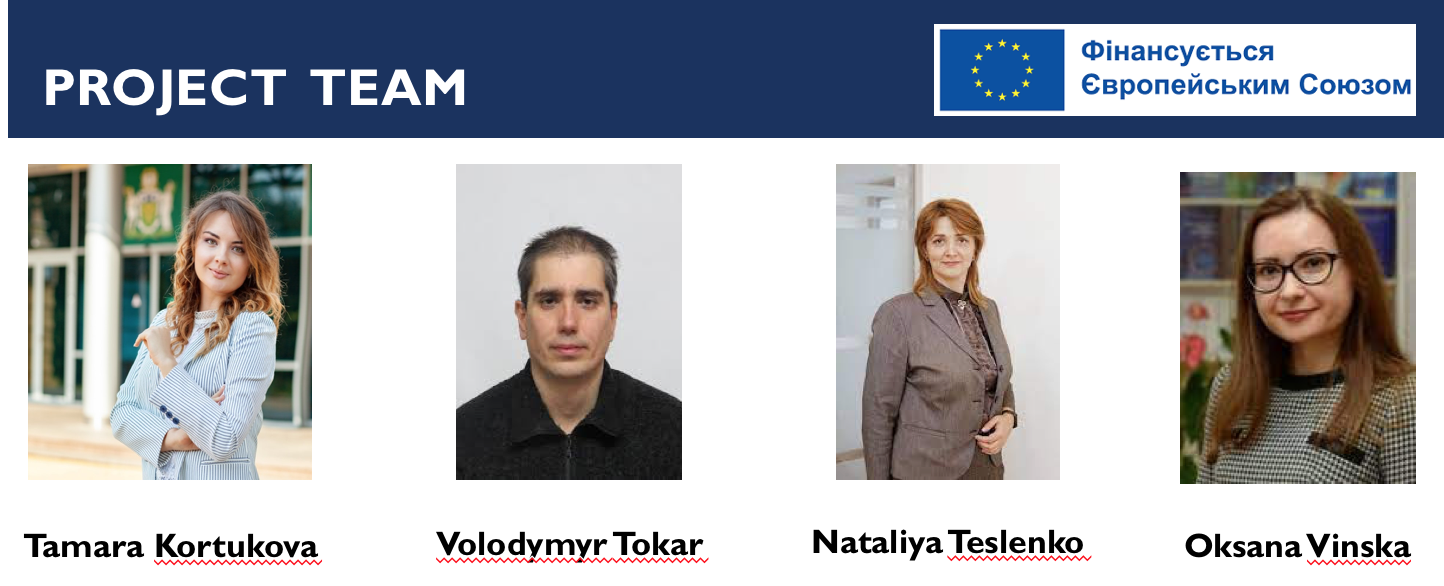
It should be noted that the program named after Jean Monnet is one of the educational programs of the European Union, the purpose of which is to increase the level of knowledge of the society on the issues of European integration.
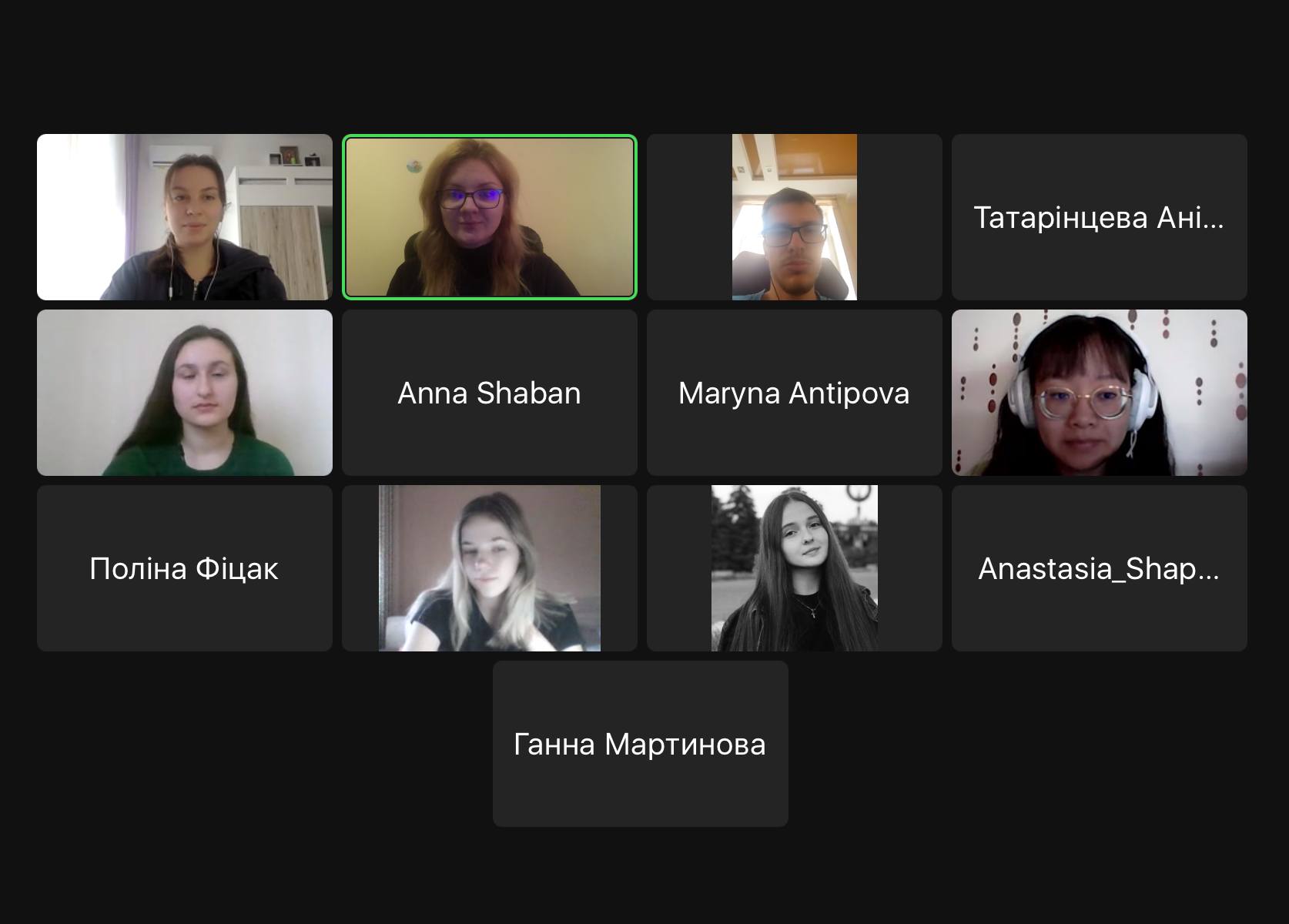
In particular, 46 students of higher education were registered for the module "EU Migration policy within Hybrid Threats", so the organizers selected the applications and formed two groups of 20 students each.
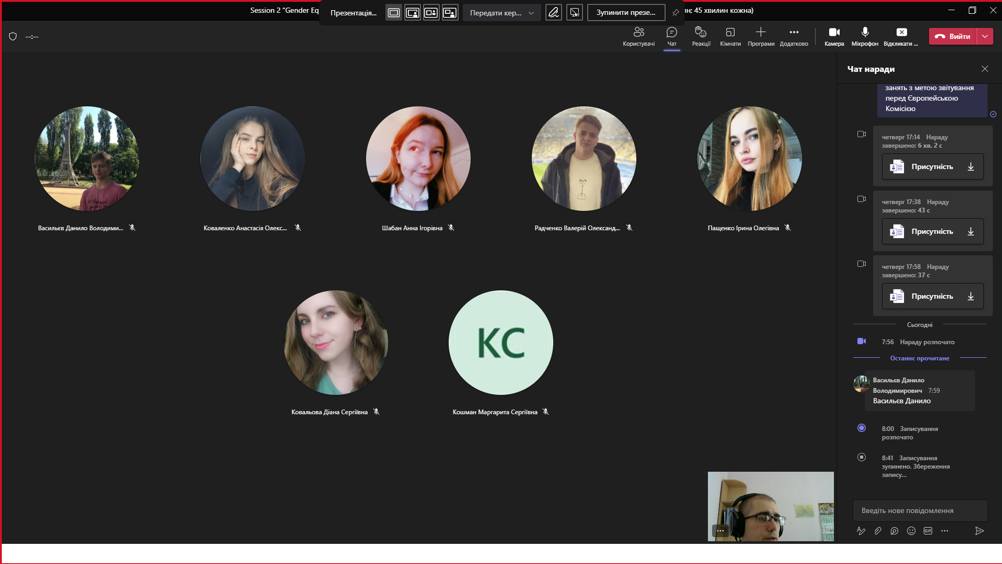
The multidisciplinary target audience was represented by students studying the following specialties: International Law; International Business; International Economics; Management of Foreign economic activity; Agribusiness; Philology.
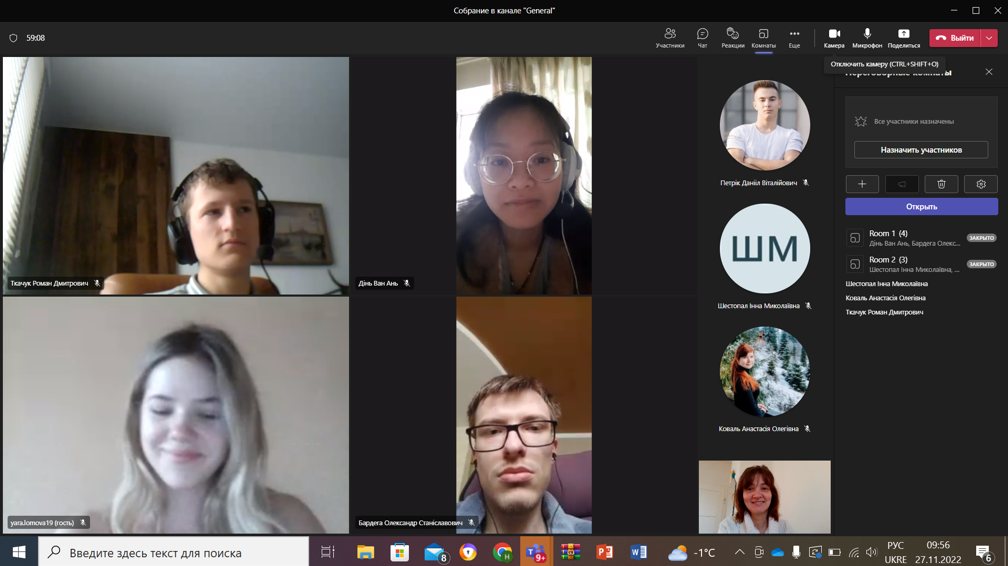
In particular, lectures were given on the following topics: Approaches to the integration of immigrants in the European Union; The practice of the EU Court regarding the integration of migrants; the European Center for Monitoring Racism and Xenophobia; EU citizenship acquisition procedure; Persons enjoying the right of free movement in the EU; Freedom of movement of workers in the EU; Gender safety and socio-economic development of EU member states; Relationship between gender equality and innovative competitiveness of EU member states; Measuring the economic capacity of women in EU member states; Gender equality in rural business management in the EU; Gender equality according to the concept of inclusion and diversity in the European Union; Union of equality; Gender quotas to promote diversity and inclusion; Training and business certification on gender equality; Main channels of illegal immigration to the EU; Legal regulation of the fight against illegal immigration in the EU; Integrated border management in the EU; EU mechanisms in the field of combating human trafficking; Adaptation processes in intercultural interaction; Assessment of national cultures of EU recipient countries; Communication errors at various stages of intercultural adaptation of immigrants in the EU; EU Environmental Strategies for Communicative Engagement with Immigrants of Islamic Origin; Social protection of working immigrants and their families in the EU; Agreements between the EU and third countries on employment; The impact of robotics on immigration processes in the EU.
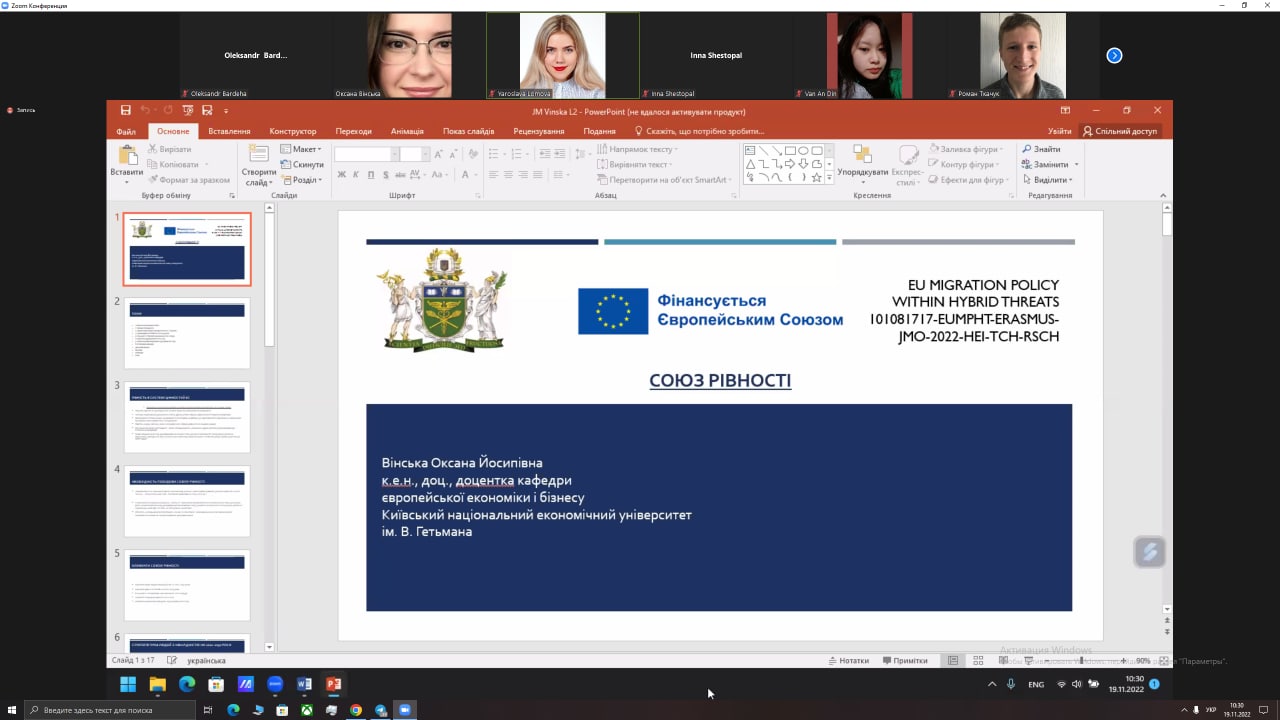
Despite all the modern challenges caused by the aggressive war of the russian federation against Ukraine, students actively participated in the discussion, worked in groups and solved problems. Therefore, we continue to hold the educational front and teach students, because an educated youth is the key to a successful future of Ukraine.





